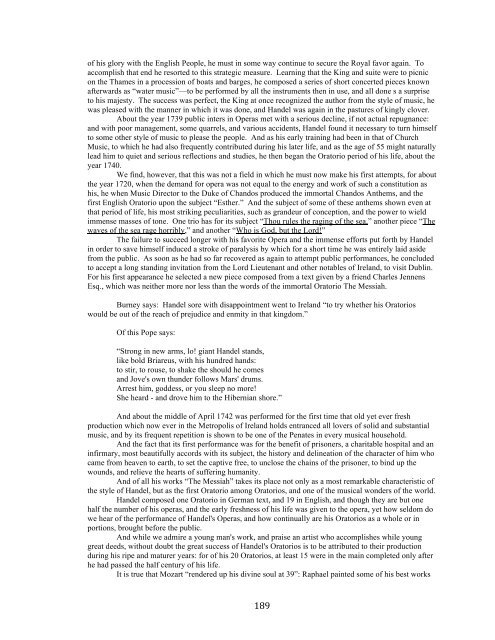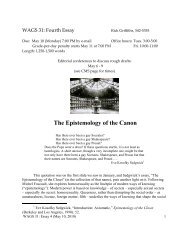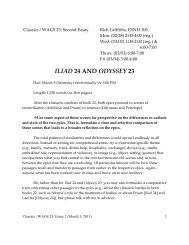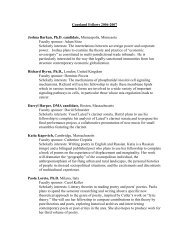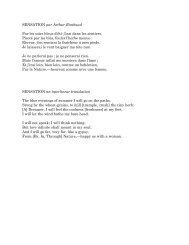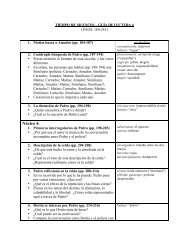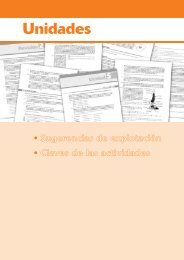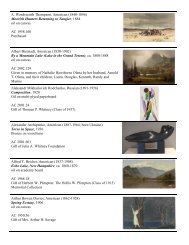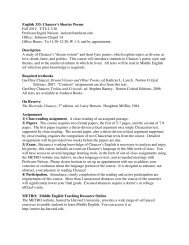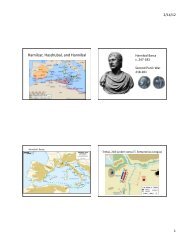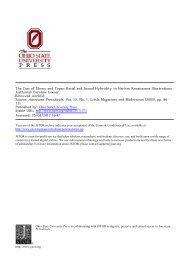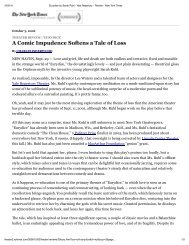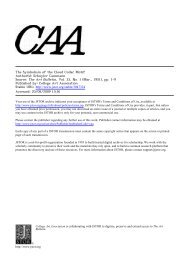Finding Their Voices - Amherst College
Finding Their Voices - Amherst College
Finding Their Voices - Amherst College
You also want an ePaper? Increase the reach of your titles
YUMPU automatically turns print PDFs into web optimized ePapers that Google loves.
of his glory with the English People, he must in some way continue to secure the Royal favor again. To<br />
accomplish that end he resorted to this strategic measure. Learning that the King and suite were to picnic<br />
on the Thames in a procession of boats and barges, he composed a series of short concerted pieces known<br />
afterwards as “water music”—to be performed by all the instruments then in use, and all done s a surprise<br />
to his majesty. The success was perfect, the King at once recognized the author from the style of music, he<br />
was pleased with the manner in which it was done, and Handel was again in the pastures of kingly clover.<br />
About the year 1739 public inters in Operas met with a serious decline, if not actual repugnance:<br />
and with poor management, some quarrels, and various accidents, Handel found it necessary to turn himself<br />
to some other style of music to please the people. And as his early training had been in that of Church<br />
Music, to which he had also frequently contributed during his later life, and as the age of 55 might naturally<br />
lead him to quiet and serious reflections and studies, he then began the Oratorio period of his life, about the<br />
year 1740.<br />
We find, however, that this was not a field in which he must now make his first attempts, for about<br />
the year 1720, when the demand for opera was not equal to the energy and work of such a constitution as<br />
his, he when Music Director to the Duke of Chandos produced the immortal Chandos Anthems, and the<br />
first English Oratorio upon the subject “Esther.” And the subject of some of these anthems shown even at<br />
that period of life, his most striking peculiarities, such as grandeur of conception, and the power to wield<br />
immense masses of tone. One trio has for its subject “Thou rules the raging of the sea,” another piece “The<br />
waves of the sea rage horribly,” and another “Who is God, but the Lord!”<br />
The failure to succeed longer with his favorite Opera and the immense efforts put forth by Handel<br />
in order to save himself induced a stroke of paralysis by which for a short time he was entirely laid aside<br />
from the public. As soon as he had so far recovered as again to attempt public performances, he concluded<br />
to accept a long standing invitation from the Lord Lieutenant and other notables of Ireland, to visit Dublin.<br />
For his first appearance he selected a new piece composed from a text given by a friend Charles Jennens<br />
Esq., which was neither more nor less than the words of the immortal Oratorio The Messiah.<br />
Burney says: Handel sore with disappointment went to Ireland “to try whether his Oratorios<br />
would be out of the reach of prejudice and enmity in that kingdom.”<br />
Of this Pope says:<br />
“Strong in new arms, lo! giant Handel stands,<br />
like bold Briareus, with his hundred hands:<br />
to stir, to rouse, to shake the should he comes<br />
and Jove's own thunder follows Mars' drums.<br />
Arrest him, goddess, or you sleep no more!<br />
She heard - and drove him to the Hibernian shore.”<br />
And about the middle of April 1742 was performed for the first time that old yet ever fresh<br />
production which now ever in the Metropolis of Ireland holds entranced all lovers of solid and substantial<br />
music, and by its frequent repetition is shown to be one of the Penates in every musical household.<br />
And the fact that its first performance was for the benefit of prisoners, a charitable hospital and an<br />
infirmary, most beautifully accords with its subject, the history and delineation of the character of him who<br />
came from heaven to earth, to set the captive free, to unclose the chains of the prisoner, to bind up the<br />
wounds, and relieve the hearts of suffering humanity.<br />
And of all his works “The Messiah” takes its place not only as a most remarkable characteristic of<br />
the style of Handel, but as the first Oratorio among Oratorios, and one of the musical wonders of the world.<br />
Handel composed one Oratorio in German text, and 19 in English, and though they are but one<br />
half the number of his operas, and the early freshness of his life was given to the opera, yet how seldom do<br />
we hear of the performance of Handel's Operas, and how continually are his Oratorios as a whole or in<br />
portions, brought before the public.<br />
And while we admire a young man's work, and praise an artist who accomplishes while young<br />
great deeds, without doubt the great success of Handel's Oratorios is to be attributed to their production<br />
during his ripe and maturer years: for of his 20 Oratorios, at least 15 were in the main completed only after<br />
he had passed the half century of his life.<br />
It is true that Mozart “rendered up his divine soul at 39”: Raphael painted some of his best works<br />
! 189!


